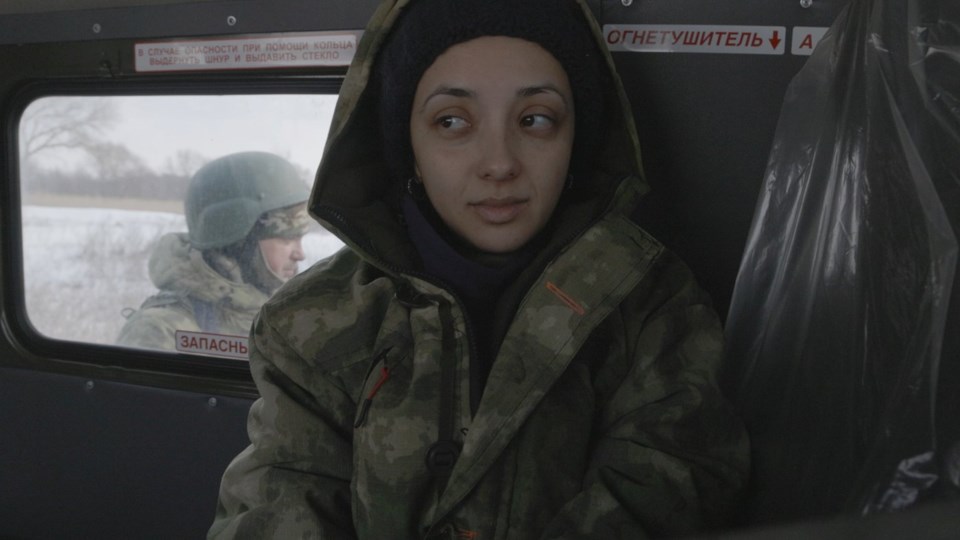Anastasia Trofimova risked her life to make “Russians at War” — and then spent the next year fighting to have the film shown.
Now, after months of cancellations, protests and threats, the controversial documentary will bypass traditional channels and release directly to audiences on Tuesday.
The film, which follows Russian soldiers on the front lines of the war in Ukraine, drew a standing ovation at its Venice world premiere in 2024 but quickly became a lightning rod.
Its North American debut at TIFF last year was met with demonstrations from pro-Ukraine groups who called it Russian propaganda. Its screenings had to be rescheduled due to "significant threats to festival operations and public safety."
The blowback continued throughout the year, with festivals including Athens and Zurich withdrawing the film due to mounting protests and security concerns.
Meanwhile, TVO scrapped plans to air the documentary after the backlash, leaving it without a distributor.
“I was getting death threats and all sorts of abuse,” says Trofimova of the backlash.
“It was shocking. You go to the war against all odds, you bring back a story, you go deeper than other people because you're that much more obsessed about it, and you are getting attacked by people who have not been even close to the war, but they're telling you what it's like.”
The Russian-Canadian director points out that many of the film’s detractors said they hadn’t seen the film and didn’t intend to.
“They're refusing to see the film, but have very strong opinions on it. So that's been a bit surprising,” she says on a video call.
In “Russians at War,” Trofimova embeds herself with Russian troops on the front lines of the conflict in Ukraine, capturing their personal experiences and perspectives. While some have praised it for its unfiltered portrayal of soldiers' realities, others have criticized it for lacking historical and political context about the invasion, raising concerns that it might whitewash the actions of the Russian military.
The film's producer Cornelia Principe says the direct-to-audience release is “partly by design, partly by necessity.”
“It was important for us to get it out there so people can see it, because part of the controversy is coming from places where people haven't seen the film,” explains the Oscar-nominated producer behind 2022’s “To Kill a Tiger.”
Principe says “Russians at War” is still being shopped to European broadcasters and will air on British Columbia’s Knowledge Network this fall as part of a series of films about the war in Ukraine.
Lawyers representing the film threatened TVO with legal action last year for pulling the film, but Principe says both parties have since reached “a mutually satisfactory settlement of our dispute and have agreed not to comment further.”
She says her production company, Raja Pictures, has reclaimed the film’s rights.
The film is available to rent worldwide at russiansatwar.com, except in Russia, Ukraine, and Belarus, where producers plan to offer it for free at a later date.
Principe says they took inspiration from the Oscar-winning documentary “No Other Land,” about the Israel-Palestine conflict, and “Union,” which follows Amazon workers’ fight to unionize — both titles faced distribution hurdles and ultimately went the direct-to-audience route.
Trofimova says the intense backlash to “Russians at War” revealed just how vulnerable films can be to organized attacks.
“It was shocking how easy it is to attack a film. If you are an interest group, if you're a state, if you’re a corporation, it's not that hard to get screenings cancelled or to muddy the waters around what it’s about,” she says.
“How do we make complex films and get them out there, despite the fact that they will most likely be attacked by some sort of interest group?”
Principe worries about the chilling effect such pressure could have on creative freedom.
“Are we leading to situations where filmmakers will self-censor, where broadcasters will self-censor, where festivals will self-censor and not take on difficult things?”
Still, Principe says she and Trofimova “listened to what people were saying.”
In response to criticism that “Russians at War” lacked sufficient context on the Russian invasion of Ukraine, they added an introductory card to the direct-to-audience version noting that the invasion is “the deadliest conflict on European soil since WWII” and that war crimes investigations by the International Criminal Court are underway.
As for those still reluctant to watch the film, Trofimova says: “Watch it when you’re ready.”
“It's not a film where it's like ‘gotcha.’ It's not a film where I aimed to dehumanize someone. It's a document of history and this war is scary. And this war, it is a tragedy and it's still continuing. And when you watch it, just know that it's continuing,” she says.
“I hope, on the human part, we can see each other as people, and I hope that once you see what war looks like, anyone who has any illusions will understand a little bit more.”
This report by The Canadian Press was first published Aug. 12, 2025.
Alex Nino Gheciu, The Canadian Press


